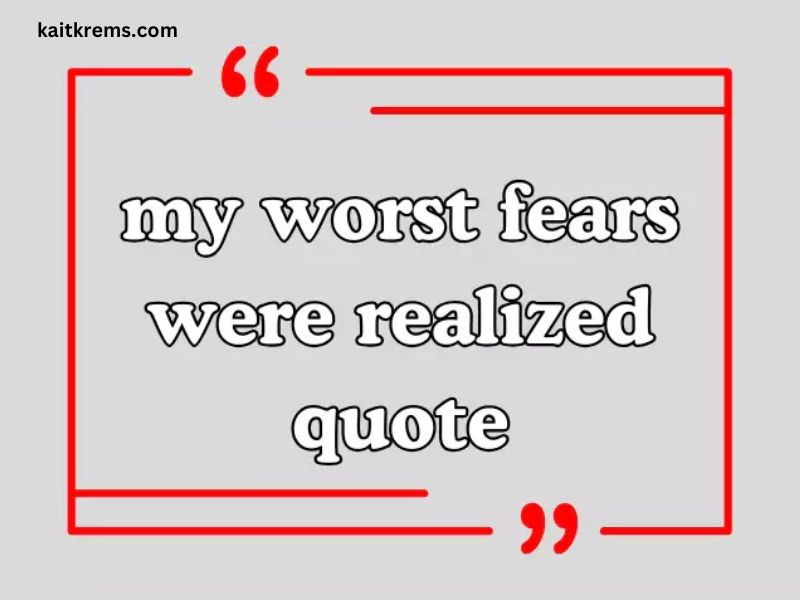Fear is one of the most primal emotions humans experience. It can manifest in countless ways: as anxiety about the future, dread of the unknown, or even a deep-rooted terror of something specific. One of the most chilling realizations someone can have is when the fear they’ve been avoiding, denying, or struggling with for years actually comes true. The phrase “my worst fears were realized” encapsulates the moment when we confront our greatest anxieties head-on, often with overwhelming emotions of shock, disbelief, and sometimes even relief.
The words “my worst fears were realized” represent more than just the arrival of a feared event or outcome; they capture the profound vulnerability and disillusionment that accompany it. They suggest that not only did something bad happen, but the very worst version of the story unfolded. In this article, we will explore the significance of this experience, its psychological impact, and how we can grow from facing our darkest fears.
The Anatomy of Fear
To understand the weight of the phrase “my worst fears were realized,” we first need to examine the nature of fear itself. Fear, in psychological terms, is an emotional response to a perceived threat. It triggers a cascade of physiological and cognitive reactions designed to prepare us for a fight-or-flight response. While fear can be life-saving when we face real, immediate danger, it can also be paralyzing when it arises from imagined or anticipated threats.
The human mind is capable of conjuring some of the most intense, irrational fears. Whether it’s the fear of failure, rejection, loneliness, or even death, these anxieties are often amplified by our own imaginations. We may create elaborate mental scenarios of how things could go wrong, and the anticipation of such a disaster can be more overwhelming than the actual event itself.
However, when those imagined fears eventually materialize, the reality of facing them can be deeply unsettling. The mind, once consumed with the worst-case scenario, suddenly becomes confronted with it. In this sense, the phrase “my worst fears were realized” often reflects an emotionally charged moment of reckoning—where the fear was no longer an abstract concept but an undeniable reality.
The Paradox of Fear: Anticipation vs. Reality
Before something we dread occurs, the mind is prone to exaggerating the potential consequences. We anticipate the worst, imagining an irreversible collapse, a catastrophic loss, or a life-changing event. Our thoughts spiral, and the perceived scale of the fear grows exponentially. The experience of anxiety before an event can often be far more intense than the event itself.
Consider, for example, someone who fears public speaking. The mere thought of standing in front of an audience may evoke a sense of dread—palpitations, a dry mouth, and overwhelming anxiety. They might picture themselves stumbling over words, being ridiculed, or even suffering a panic attack in front of others. But the moment they step onto the stage and begin speaking, they often realize that the reality isn’t nearly as bad as they had imagined. The audience may be more supportive than they anticipated, and their performance, while imperfect, doesn’t result in the complete disaster they feared.
Similarly, when we think of the worst-case scenario in any situation—whether it’s a health scare, relationship breakdown, or career failure—our minds often focus on the potential for total collapse. But when those fears are realized, we may find that we are more resilient than we initially believed. Yes, the event might be painful or disappointing, but it’s rarely as catastrophic as our imagination painted it to be.
Yet, the realization of a worst fear can also lead to a profound sense of shock. It’s not that the fear is ever truly “overcome” in the traditional sense. It’s that the fear loses its power once it becomes tangible. In confronting our darkest anxieties, we strip away the illusion of the unknown, and this can be both liberating and terrifying.
The Psychological Impact of Realizing Our Worst Fears
When our worst fears come to fruition, the psychological impact can be profound. There are several key emotional responses that are commonly experienced when someone faces their greatest dread.
- Shock and Disbelief
The first reaction to a worst-case scenario is often one of disbelief. The mind struggles to reconcile the fear it anticipated with the reality of the event. There’s a sense of numbness, as if the brain cannot fully process what has just occurred. This is particularly true if the event is something we have been dreading for a long time. It’s almost as though our minds were preparing for an event that never actually seemed plausible, so when it happens, it’s difficult to accept. - Fear of the Unknown
Even after the worst has happened, there is still the fear of what comes next. A health diagnosis, a breakup, or a career failure can feel like the beginning of an entirely new, and often frightening, reality. The unknown of the future looms large. We are no longer just dealing with the fear of the event itself but the fear of what the event will mean for our lives moving forward. Will we recover? Will we be able to handle the consequences? - Feelings of Helplessness or Defeat
There can also be a profound sense of helplessness when our fears come to life. This is especially true if we feel that we have no control over the situation or if the event has truly shattered our expectations. When people experience the full manifestation of their fears—whether it’s losing a job, being diagnosed with an illness, or having a relationship fall apart—they may feel as though they are powerless to stop the cascade of negative consequences. There’s often an overwhelming sense of defeat in such moments. - Grief and Loss
The realization of a worst fear can also trigger grief. Even when the event is not necessarily a tragic loss of life, it might represent the loss of a dream, an ideal, or a sense of security. For example, someone who fears failure might experience grief when they realize that a long-held goal is no longer achievable. Similarly, someone who fears rejection might mourn the loss of a relationship or connection that they had valued. These are moments of deep emotional pain, as the person comes to terms with the loss of something they had once hoped for.
How Facing Our Fears Can Lead to Growth
Despite the intense emotions that accompany the realization of our worst fears, there is also the potential for growth. Facing our deepest anxieties head-on is rarely an easy process, but it can ultimately lead to greater resilience, wisdom, and self-acceptance.
- Resilience
When we confront our worst fears and live through the aftermath, we often discover just how resilient we are. The shock may be overwhelming in the moment, but as time passes, we start to regain our strength. The realization that we can survive—even thrive—after our greatest fear comes true can empower us to face future challenges with more confidence. In this way, the experience can build our emotional muscle. - Clarity and Perspective
Facing our worst fears also forces us to gain a new perspective. After the initial shock, we may be able to see the situation more clearly. We might realize that while the event was painful, it wasn’t the end of the world. Our values may shift, and we may begin to see what truly matters in life. In many cases, what we feared the most was an illusion, and once it is stripped away, we are left with a clearer sense of who we are and what we want moving forward. - Liberation from Fear
The greatest gift of confronting our worst fears is often liberation. Fear thrives on uncertainty and the unknown, but once we face our anxieties directly, the power they hold over us diminishes. We can no longer be paralyzed by the fear of what could happen, because we have already experienced it. In this sense, realizing our worst fears is often the key to overcoming them. - Self-Acceptance and Healing
Finally, facing our worst fears can lead to profound healing. The experience forces us to confront not just the external event but also the internal narrative we’ve been telling ourselves. We might have been terrified of failure, rejection, or judgment, but when those fears are realized, we often discover that we are capable of handling more than we initially believed. This can lead to greater self-compassion and acceptance of our imperfections.
Conclusion
The phrase “my worst fears were realized” is often uttered in the midst of an overwhelming, transformative moment. It signifies the convergence of imagined terror and real-world reality. While facing our deepest fears can be one of the most uncomfortable and disorienting experiences, it also provides an opportunity for personal growth, resilience, and newfound strength.
Ultimately, confronting our worst fears teaches us that we are capable of surviving even the most harrowing moments. The fear that once paralyzed us becomes a part of our story—a chapter that, while painful, is one we can look back on with greater wisdom. By embracing fear, rather than running from it, we come to realize that it is not the feared event itself that holds the greatest power, but our ability to endure and grow through it.






